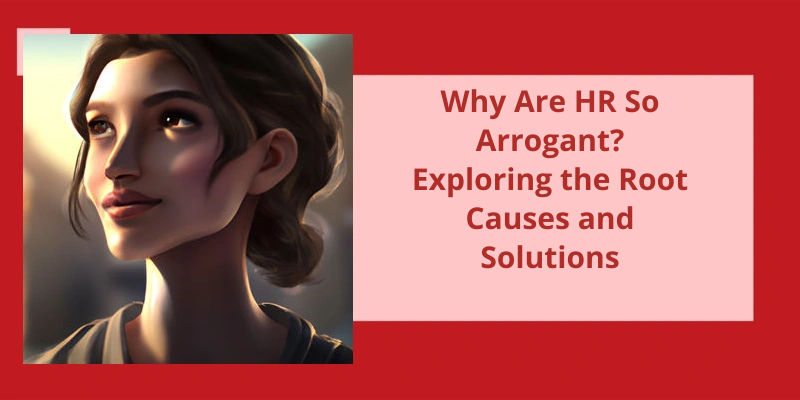It’s a common perception amongst employees that HR personnel are often seen as arrogant and unapproachable. While this may not be true for all individuals in HR, there are some common reasons why this perception exists. The very nature of HR roles often requires them to be the gatekeepers of company policies and practices, which can lead to their behavior being perceived as controlling or unresponsive. Additionally, HR personnel often hold a position of authority within the organization, which may make them feel elevated and superior to others. In some cases, the pressure to uphold company interests and maintain an air of professionalism may also contribute to HR personnel appearing aloof or unapproachable. It’s important to understand these potential reasons for HR behavior in order to effectively communicate and work with these individuals as a team.
Why Do Some People Hate HR?
This kind of mistrust in HR can also stem from the perception that these professionals prioritize the companys interests over the employees. While it’s true that HR plays an essential role in organizational strategy and ensuring that company goals are met, there’s a fine line between promising to create a fair and equitable work environment and actually following through on that promise.
Moreover, because HR is often tasked with mediating conflicts and resolving disputes, some people may feel disillusioned when their complaints aren’t addressed satisfactorily. This can further feed into the belief that HR isn’t interested in their well-being or fails to provide adequate support.
Another reason why some people harbor negative views of HR is that they view the department as a mere gatekeeper, existing simply to enforce rules and regulations without considering the human impact of their decisions. In a way, HR is seen as cold and impersonal, and not invested enough in workers needs or welfare.
Further, HR can sometimes be seen as intrusive or invasive. The collection of personal data and sensitive information, such as medical histories, can raise concerns about privacy and confidentiality. Additionally, employees may feel that HR isn’t always transparent in their operations or that their data is being misused for ulterior motives.
Finally, negative interactions with HR can cause people to hold a grudge or develop a general animosity toward the department. If an employee has had a bad experience with HR, they may find it challenging to establish trust and mutual understanding in future interactions. This can create a vicious cycle of mistrust and negativity that ultimately undermines HRs ability to facilitate positive workplace outcomes while also supporting employees growth and development.
However, in practice, some employees may feel like HR isn’t living up to these promises, leading to a lack of trust in the department as a whole. Let’s explore some of the reasons why employees might have reservations about HR.”
Why Do People Distrust HR?
However, many employees don’t believe this to be the case in practice. They may see friends or family members of HR representatives receiving preferential treatment, while other employees are left with less desirable workloads. This perceived inconsistency can cause trust in the HR department to erode quickly.
Another reason for distrust could be due to employees feeling like their concerns aren’t being taken seriously by HR. For instance, an employee may report an incident of harassment or discrimination to HR, only to be met with little to no action. When issues aren’t addressed properly, this sends a message to other employees that the HR department doesn’t prioritize their safety or well-being. This lack of action can also contribute to a culture of fear in the organization, with employees hesitant to speak out about their concerns.
This perception can arise from HR departments prioritizing the companys interests over employee interests. For instance, if an HR representative is tasked with managing layoffs, they may focus on how to reduce costs for the company, rather than how to support affected employees. This focus on the companys bottom line can create a perception that HR departments aren’t looking out for the well-being of employees.
For instance, if a company implements a new policy without consulting employees or communicating the reasoning behind the policy, employees may feel like their voices aren’t being heard. This lack of transparency can lead to confusion and mistrust among employees, as they may feel like HR departments are making decisions that impact their work without any input from them.
Lastly, some employees may not trust HR due to bad past experiences with HR departments. If an employee has had negative interactions with an HR representative in the past, they may carry that experience forward and feel hesitant to engage with HR in the future. This kind of distrust can be challenging to address, as it requires building back trust that’s been eroded over time. Each organization will have unique challenges to overcome, but building trust with employees is essential for creating a positive workplace culture.
Source: Why is HR the most hated department in an organization?..
Working in human resources can be a challenging and rewarding job. However, there are certain aspects that HR managers may dislike about their roles. In this article, we will explore five common things that HR managers may find frustrating or difficult, from dealing with dramatic employees to feeling uninspired by the job. Let’s take a closer look at what can make HR a challenging profession.
What to Dislike in HR?
Human Resource managers are often faced with numerous challenges in their day-to-day job activities. From ensuring compliance with employment laws and regulations, mapping out employee benefits programs and compensation packages, dealing with disputes and grievances amongst employees, to recruiting and training staff members, these professionals have their hands full. However, despite the many responsibilities that come with their job, HR managers often find themselves unhappy with certain aspects of their roles. Here are some of the things that HR managers dislike about their jobs.
One of the biggest complaints that HR managers have is the lack of control they’ve over management. HR managers may be tasked with implementing certain policies, procedures and initiatives that they know are beneficial to the company and it’s employees, but without the backing of management, these efforts may be futile. This can lead to a sense of frustration and discontent among HR managers.
Another issue that HR managers face is dealing with dramatic employees. From employees who complain about every tiny issue to those who create drama and stir up conflicts amongst their colleagues, HR managers often find themselves caught in the middle. This can be exhausting, and HR managers may feel like theyre babysitting rather than managing.
Employees who threaten can also add to the stress levels of HR managers. Whether it’s a physical threat or a threat to quit their job, such behaviour can create a toxic work environment that HR managers must try to mitigate. This can be challenging, and HR managers may feel like they’re walking on eggshells around such employees.
HR managers may also encounter bad vibes from employees. Whether it’s because of a change in management, a new policy or something else, some employees may exhibit negative behaviours that can impact the work culture.
Finally, the uninspiring nature of the job can be another source of displeasure for HR managers. HR managers may find themselves bogged down by paperwork, meetings, and other administrative tasks that can be draining. This can cause some HR managers to lose motivation and passion for their jobs, which can lead to a lack of productivity and engagement.
Additionally, negative behaviours from employees and the uninspiring nature of the job can add to HR managers dissatisfaction. However, despite these challenges, HR managers play a critical role in ensuring the success of the company and the wellbeing of it’s employees.
Having a good reputation is important in any field, and HR is no exception. How HR is perceived can have a significant impact on the success of the organization as a whole. HR reputation is influenced by a variety of factors, including the quality of service provided, the competence and leadership of HR professionals, the overall context in which HR operates, and the level of trust that employees have in HR outcomes. In this article, we’ll explore why HR reputation matters and how companies can work to improve it.
What Is HR Reputation?
HR reputation refers to the overall perception of HR service within an organization. It reflects the positioning and leadership of the HR function, the skills and abilities of HR professionals, and the context in which HR operates. Most importantly, it encompasses the trust in HR and HR outcomes.
The positioning and leadership of HR also significantly impact the HR reputation. HR leaders should be visionaries who can innovate and align HR strategies with overall organizational goals. They should ensure that HR services align with the organizations culture, values, and mission. HR leaders should also cultivate an inclusive and diverse culture within the organization, which enhances the HR reputation.
HR professionals should possess a high level of expertise in their respective fields and stay updated with the latest HR trends and best practices. They should also possess excellent interpersonal and communication skills to effectively communicate with employees and other stakeholders.
This includes the legal and regulatory framework that governs HR activities. HR professionals should be aware of and comply with these regulations to maintain the HR reputation. The HR function should also ensure that employees and other stakeholders understand the policies and regulations of HR to enhance transparency and accountability.
The Importance of HR Reputation in Attracting and Retaining Talent.
In order to attract and retain talent, it’s important for a company to have a positive reputation in their HR practices. This includes fair hiring processes, competitive compensation and benefits packages, and a supportive work culture. A strong HR reputation can lead to a more engaged, motivated, and loyal workforce, which ultimately benefits the company as a whole.
In addition to communication skills, there are other qualities that make for a successful HR professional. These can range from analytical and problem-solving skills to a solid background in psychology or business. So, if you’re considering a career in HR, it’s important to understand what skills and qualities are needed in order to rise to the top of your field.
What Type of People Go Into HR?
In addition to communication skills, those who go into HR often possess a strong sense of empathy and an ability to problem-solve. HR professionals are often tasked with not only managing employee relations but also coming up with creative solutions to workplace issues. As a result, individuals who enter HR are often naturally curious, analytical, and possess a “big picture” thinking mindset. These skills allow them to tackle complex HR issues and find innovative solutions.
To be successful in HR, individuals also need to be highly organized and detail-oriented. HR professionals must manage a wide range of tasks such as onboarding, benefits administration, compliance and regulatory requirements, and employee relations. Attention to detail and the ability to multitask are critical skills for success in HR.
Finally, HR is a field that values continuous learning and development. Those who succeed in HR are often lifelong learners who stay up-to-date on trends and best practices in the field. As such, those who enter HR should have a natural curiosity and desire to constantly improve and evolve their skillset.
HR is a highly rewarding career path for those who value the importance of supporting and developing a company’s most valuable asset, it’s people.
The Different Roles and Responsibilities Within an HR Department (e.g. Recruiter, Benefits Administrator, Employee Relations Specialist, Etc.)
This topic covers the various tasks and duties carried out by different job positions within an HR department. Examples of these job positions include recruiters, benefits administrators, employee relations specialists, and more. Each position has unique responsibilities that contribute to the overall functioning of the department.
However, HR plays a much larger role than just these basic functions. It’s vital for organizations to recognize the strategic importance of HR in developing and implementing policies that promote employee engagement, talent management, and organizational culture. As such, HR must move beyond it’s traditional administrative role and become a strategic partner in driving business success.
How Is HR Perceived?
However, the role of HR is much more than just these functions. Human Resource Management has a crucial role in managing the overall culture, structure, and practices of an organization that can directly impact employee engagement and retention. The HR function is responsible for developing and implementing policies and procedures that govern the employment relationship between employees and employers. This includes everything from creating job descriptions to developing employee handbooks to managing employee relations.
HR is often also considered a strategic partner within an organization. With the increasing focus on talent acquisition and retention, HR has become an essential player in developing and executing a companys strategic plan. HR professionals are expected to be knowledgeable about the business objectives, values, and goals of the company to align the recruitment, compensation, development, and retention strategies with the companys needs.
While the HR function is essential, it’s often seen as a cost center rather than a business unit. Companies often view HR as a support function rather than a value proposition. This perception can make it challenging for HR professionals to justify the value of their work to senior management. HR has to work hard to demonstrate how their efforts have a direct impact on the bottom line of the organization. This challenge can also lead to budget cuts during an economic downturn, which can hurt morale and slow down progress.
Another perception of HR is that it’s a bureaucracy that prioritizes compliance over results. This perception often comes from the abundance of regulations and policies that govern the employee-employer relationship. HR professionals must focus on compliance as part of their job, but this doesn’t mean they must sacrifice results. HR professionals must strike a balance between compliance and business results to be seen as valuable to their organizations.
It’s a strategic partner that creates policies, procedures, and practices that positively impact an organizations culture and employees. However, it isn’t without it’s challenges. HR faces perceptions of being a cost center, a bureaucracy, and a place for employee grievances. HR must work hard to demonstrate it’s value to the organization, balance compliance and business results, and build trust with employees.
Challenges Faced by HR in Small Businesses
- Recruiting and attracting top talent
- Providing competitive compensation and benefits
- Creating a strong company culture
- Managing employee conflicts and grievances
- Staying up-to-date with labor laws and regulations
- Handling employee turnover
- Developing and implementing effective training programs
- Maintaining employee morale and motivation
Conclusion
Ultimately, the key to improving relationships between HR and other employees is through open communication, empathy, and a commitment to cultivating a culture of collaboration and mutual respect in the workplace. This requires a concerted effort from all parties involved, and a willingness to challenge our own assumptions and biases. By taking a more nuanced and thoughtful approach to understanding the reasons behind perceived HR arrogance, we can work towards creating a more positive and productive work environment for everyone.






